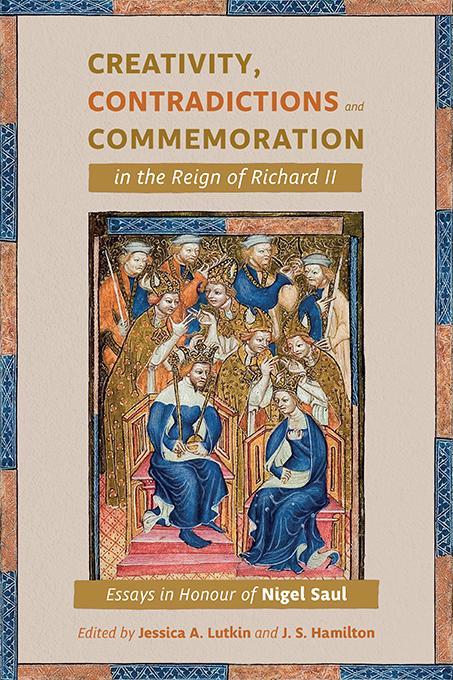 Creativity, Contradictions and Commemoration in the Reign of Richard II
Creativity, Contradictions and Commemoration in the Reign of Richard II 10 - Power, Piety, and Presence: The Cult of Corpus Christi and the 1389 Guild Enquiry in Lincolnshire
Published online by Cambridge University Press: 26 May 2022
Summary
‘In the year of our Lord 1318 the feast of Corpus Christi was first celebrated by the whole English Church.’ This extract from documents relating to the Abbey of St Peter in Gloucestershire records the earliest known celebration of the feast of Corpus Christi in England. Just eight years later, in 1326, Louth in Lincolnshire became home to one of the earliest known Corpus Christi guild foundations in the country, and just two years after that, the Tailors’ Guild in Lincoln also decided to dedicate themselves to the cult. Lincolnshire continued to lead the way in Corpus Christi guild dedications in the late Middle Ages; the evidence for this can be seen clearly in the 1389 guild enquiry ordered by Richard II's government. For Lincolnshire, the surviving documents point to a particularly strong connection in the county with the cult of Corpus Christi from a very early stage in its transmission.
This chapter is not concerned with the wealthy and prominent Corpus Christi guilds of the fifteenth and sixteenth centuries, such as those seen at York, Coventry, and Norwich, and about which there is already much scholarship. Rather, it explores the earlier associations within the first few generations of the feast being celebrated in England. This chapter investigates the emergence of Corpus Christi as a popular guild dedication in Lincolnshire, reflecting on the form and function of these early Corpus Christi guilds, their links to processional modes and early pageantry, and the European influences that helped to form their identities.
The feast of Corpus Christi is a celebration of the Eucharist, honouring the process of the wafer and wine transforming into the blood and body of Christ. On the feast day itself, the mass was heard first and then followed by a procession in which the consecrated host was carried through the town; after this, there would be a ceremonial feast. The reception of the feast and its institution across the diocese and parishes of Europe had halted with the death of Pope Urban IV in October 1264. It took another half a century before its cause was taken up again by Pope John XXII, when the feast was incorporated into the Clementines in 1317; it was after the publication of the Clementines that the feast was fully integrated into the Church.
- Type
- Chapter
- Information
- Creativity, Contradictions and Commemoration in the Reign of Richard IIEssays in Honour of Nigel Saul, pp. 203 - 218Publisher: Boydell & BrewerPrint publication year: 2022


